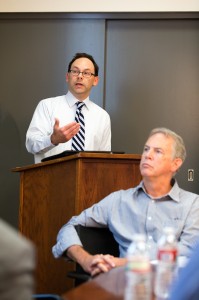Panelists analyze how the world sees the US America
Richard Wike, associate director of Pew Research Center’s Global Attitudes Project, gave a presentation on global opinions of the United States on Wednesday at the USC Annenberg School for Communication and Journalism.

Global view · Richard Wike, associate director of Pew Research Center’s Global Attitudes Project, speaks as Professor Robert Banks looks on. – Ralf Cheung | Daily Trojan
The event, hosted by the USC Center on Public Diplomacy (CPD), took place from 12 to 1 p.m. Accompanying Wike was Annenberg adjunct professor Robert Banks and CPD Director Jay Wang. The event was part of the center’s Conversations Series.
Wike’s discussion largely focused on statistics collected from the most recent Pew survey. Wike said, however, that the point of the study was not to make policy recommendations or offer ways to remedy issues.
“We don’t tell the government what to do,” Wike said. “We put the information out there, and we rely on the smart people out there to find the next step.”
Of all foreign countries, Italy was the most positive toward America, and Pakistan the least, with 85 percent of those surveyed disapproving of America. In terms of regions, sub-Saharan Africa was the area that found America most favorable.
“Bush was pretty popular there,” Wike said.
Wike also brought up the idea of an “Obama effect.” The data pointed to an increase in American favorability after Obama’s inauguration. The effect, however, has not touched all areas.
“Turkey, Egypt, Jordan and Pakistan are countries that really haven’t seen an Obama effect. Favorability spiked up a little bit in Turkey [after his election], not a great rating,” Wike said.
Not all areas of American culture were viewed equally, according to the survey. American media and technology were held in high regard. American ideas and democracy were met with hostility.
“They do want their American music and TV,” Wike said. “The flipside is that they worry about it pushing out their own local customs and traditions.”
Presenters had different opinions on the statistics.
“Some of these statistics were evocative. Some were surprising. Some were reassuring. Some were depressing,” Banks said.
During the discussion portion of the event, the audience, largely comprised of Annenberg graduate students, asked questions on topics ranging from methodology to effects of the survey.
Wike seemed particularly interested in the aspects in which American favoritsm is weak, such as the topic of drones strikes.
“There are some countries where we have seen some difference [within demographics]. But overall patterns we do not see it. The one place where we see a big difference is drone strikes. When we ask the drone question we get big gaps,” Wike explained.
Military-based questions also elicited mixed results..
“The most [interesting thing] is how [many] Americans see China replac[ing] America. Forty-seven percent say yes, 47 percent say no,” said Ian Koo, a graduate student in the public strategy and relations program. “I [would] think that Americans would be more confident.”
Wike’s presentation included a segment on opinions of China and whether or not it would become the next superpower.
“In the spring of 2008, before the economic crisis really kicked in, 20 percent were saying China, and 47 percent [were] saying the U.S. [would be the superpower]. In this year, the China numbers came up substantially, and U.S. numbers drop,” Wike said. “This is a big change in only a five-year period in what Europe thinks is the world economic leader.”
Yating Zhao, a graduate student from China in the communication management program, was particularly curious about the data on China.
“I think the most interesting part was that he mentioned that the image of China is increasing. Lots of people think China will one day replace the United States in the world,” Zhao said. “When I was in China, a lot of Americans thought China was the biggest threat. I got it from the real data, so it was very impressive to me.”
The full discussion, along with a one-on-one interview with Richard Wike conducted by Lauren Madow, a graduate student in public diplomacy, will be posted to the CPD website, uscpublicdiplomacy.org on Monday.
Follow us on Twitter @dailytrojan
